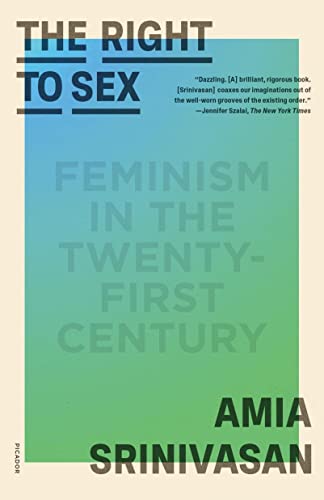The Right to Sex
Feminism in the Twenty-First Century
Amia Srinivasan
BOOK REVIEW

In the sprawling expanse of modern discourse around sexuality and feminism, The Right to Sex: Feminism in the Twenty-First Century by Amia Srinivasan emerges not just as a book, but as a clarion call. With the audacity to explore the intersection of sexual politics and feminist theory, Srinivasan crafts an urgent discussion that transcends mere academic critique to penetrate the very cores of our societal norms and individual rights. This is a work that redefines the narrative surrounding women's autonomy, sexual desire, and the complex web of power dynamics that dictate who gets to express their sexuality-and who does not.
At its heart, The Right to Sex interrogates the very foundation of contemporary feminism. Srinivasan poses a provocative question: what does it mean to claim the right to sex in a world rife with inequality, oppression, and pervasive misogyny? With searing insight, she beckons readers to examine the societal structures that shape our desires, revealing how race, class, and gender intricately weave into the fabric of our sexual experiences. It's a stark reminder that the fight for sexual liberation is far from over, and it requires a nuanced understanding of the disparities that pervade it.
The brilliance of Srinivasan lies not only in her intellectual rigor but also in her ability to evoke powerful emotions through her exploration of such raw topics. There's a visceral quality to her prose-a stirring intensity that compels you to confront uncomfortable truths about your own desires and the moral implications they carry. She doesn't shy away from asking the hard questions: How do privilege and power influence our sexual encounters? Are we complicit in systems that marginalize the very people we claim to support? Through her lens, the reader is forced into a state of self-reflection, a confrontation with the disillusionment that often accompanies the fight for equality.
Srinivasan doesn't just present a linear argument; she skillfully weaves personal narratives, philosophical inquiries, and sociopolitical critiques. By doing so, she illustrates how the personal is inherently political, elucidating how our intimate lives are inextricably linked to larger societal constructs. The emotional landscape she navigates is marked by a profound sense of empathy, understanding that sexual autonomy is not merely a personal journey but a collective struggle-a struggle that reverberates through generations of women who have fought for their right to be seen, heard, and desired.
As we traverse through her pages, we encounter a medley of reactions-from discomfort to enlightenment. Early readers have been polarized; some praise her for the fearless confrontation of difficult themes, while others critique her for not offering concrete solutions to the systemic issues she highlights. It's this very discord that underscores the book's essence: in a world clamoring for clear-cut answers, Srinivasan thrusts us into the murky depths of dialogue where real change begins-not in conclusions, but in the shared experience of grappling with complexity.
Yet, amidst the turbulence, Srinivasan instills a sense of hope that resonates in the quiet spaces between her powerful assertions. She champions the idea of solidarity among women and marginalized groups, invoking a collective power that transcends oppression. By revealing the connections between sexual rights and broader feminist struggles, she acts as a beacon, guiding readers through the shadows of societal constraints toward a more liberated future.
It's impossible to engage with The Right to Sex without feeling a sense of urgency-a pulsing need to join the conversation, to challenge existing structures not just in theory but in practice. The book compels you to envision a world where sexual autonomy is a given, not a privilege; where desire is celebrated, not shamed.
In the end, Srinivasan's work is not merely an academic exploration but a necessary confrontation with the societal narratives that define our lives. It's an invitation to dream of-and actively pursue-a world where every individual possesses the right to sex, unburdened by the weight of discrimination or the shackles of patriarchal expectations. As you close the book, you're left not only with questions but also with a profound sense of possibility, a desire to engage with the issues she so boldly illuminates.
The world of The Right to Sex is rich, complex, and, above all, transformative. It pushes you to think, feel, and, dare I say, act. Are you ready to take part in this conversation? Your chance for reflection, reaction, and revolution awaits. 🌍💥
📖 The Right to Sex: Feminism in the Twenty-First Century
✍ by Amia Srinivasan
🧾 305 pages
2021
#right #sex #feminism #twenty #first #century #amia #srinivasan #AmiaSrinivasan